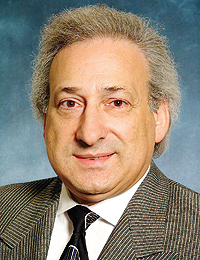Going Places
“With the Centers for Disease Control and Prevention (CDC), the national headquarters of the American Cancer Society, and so many other crucial public health entities so close by, the school is uniquely positioned. The relationships that have been built here are amazing. And in this business, no one ever accomplishes anything alone.” Mandel is well acquainted with the power of collaboration. In the 1970s, he was a young epidemiologist at the University of Minnesota. With the help of many colleagues, he designed a massive study to examine whether a specific screening test for colon cancer could reduce colon cancer mortality, and if so, how well. It was a huge undertaking, enrolling more than 46,000 Minnesotans in a study lasting 18 years. The fecal occult blood test (FOBT) could detect microscopic specks of blood in stool samples, but its effectiveness for detecting the early signs of colon cancer—the second most deadly cancer in the nation—had never been rigorously studied. Few physicians used it regularly to screen patients, and insurance companies did not cover its routine use in healthy patients. Mandel’s first conclusions were released in The New England Journal of Medicine in 1993. The randomized controlled trial showed that annual FOBT testing leads to a 33% reduction in mortality. Several studies in Europe, even larger than Mandel’s, soon confirmed his findings. Based on the Minnesota study, the US Preventive Services Task Force recommended regular FOBT screening for the first time, as did all the leading cancer organizations. It is now a routine part of annual physical exams. The study’s final conclusion was published in The New England Journal of Medicine in 2001, announcing that regular use of the FOBT annually cut the risk of colorectal cancer incidence by 20% because patients with positive results undergo a colonoscopy to determine the source of the blood. Said Mandel to a news reporter: “This is the first time anyone has demonstrated that regular fecal occult blood testing will actually prevent the development of colon cancer.” This past summer, when Mandel attended an American Cancer Society meeting in Oslo along with scientists from more than 25 countries, he realized that his research team had played a role in shaping global cancer screening policy. “I felt honored to be a part of it all, to have participated in an activity that will provide significant benefit to the population,” he says. That sentiment, he says, is exactly how he feels about joining the RSPH. “This is not just any job,” Mandel says. “I truly believe that, with me or without me, this epidemiology department is poised to become the best in the nation. We will build from here.” He would like to “move aggressively” to build a program in cancer epidemiology, teaching, and research, forging strong research relationships with Emory’s Winship Cancer Institute—where he holds a joint appointment—the American Cancer Society, the CDC, and the Georgia Cancer Coalition. “The university’s commitment to cancer research and the Georgia Cancer Coalition were key to my decision to come to Emory,” he says. “And the resources in this department alone are extraordinary.” One of the world’s premier sources of cancer statistics—the Surveillance, Epidemiology, & End Results (SEER) program—is housed in the Department of Epidemiology. Faculty member John Young routinely shares his expertise on tracking local and global trends with other states and nations around the world. “With the registry right here in the department, the cancer research opportunities here are huge,” says Mandel. Born and raised in Manitoba, Canada, Mandel received an undergraduate degree in mathematics at the University of Manitoba in 1966. He worked with the Canadian government in Ottawa as a health statistician before taking a position in statistics and epidemiology at the University of Ottawa Medical School. He then decided to seek graduate MPH and PhD degrees in epidemiology at the University of Minnesota, where he joined and remained on the faculty for 27 years. Mandel’s mentor there was Leonard Schuman, who contributed to a historic epidemiological finding while serving on the first Surgeon General’s Committee on Smoking and Health in 1964. “It was the first formal declaration from the government that smoking did indeed cause cancer, and it was a very courageous move, given strong resistance against acknowledging the connection,” says Mandel.
He arrived on campus this past fall just in time to greet incoming students, and he appeared to relish the experience. “The atmosphere here is so dynamic,” he commented. “Great things will continue to happen here.”
CFAR | Fighting Global Violence | Commencement | Alumni Weekend | Class Notes 2001-2002 Donor Report | Rollins School of Public Health Copyright © Emory University, 2003. All Rights Reserved. Send comments to hsnews@emory.edu. |

